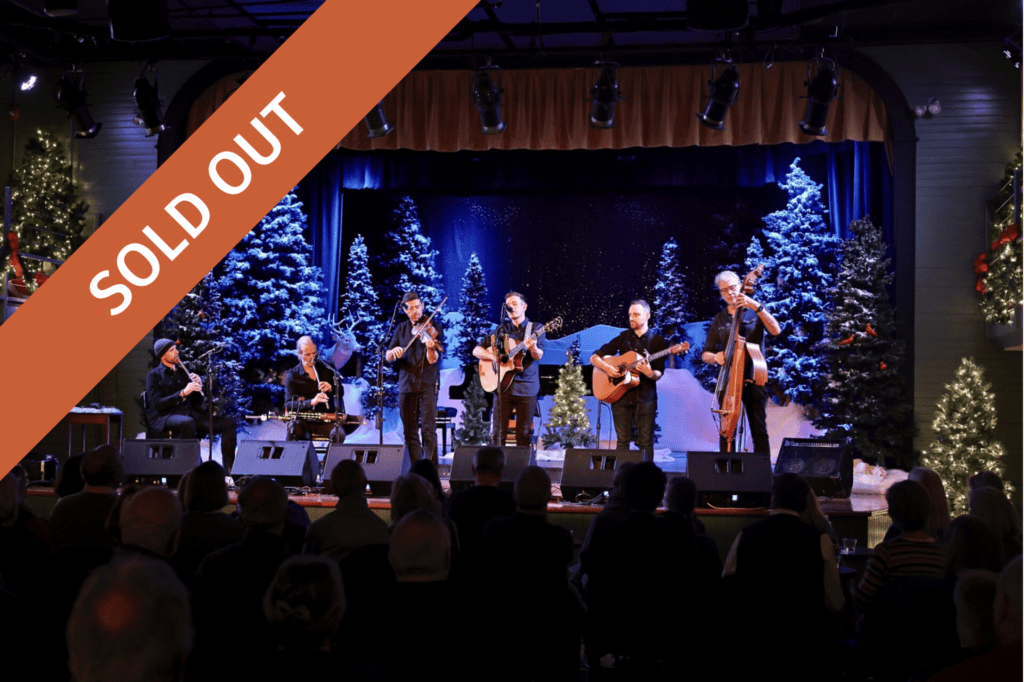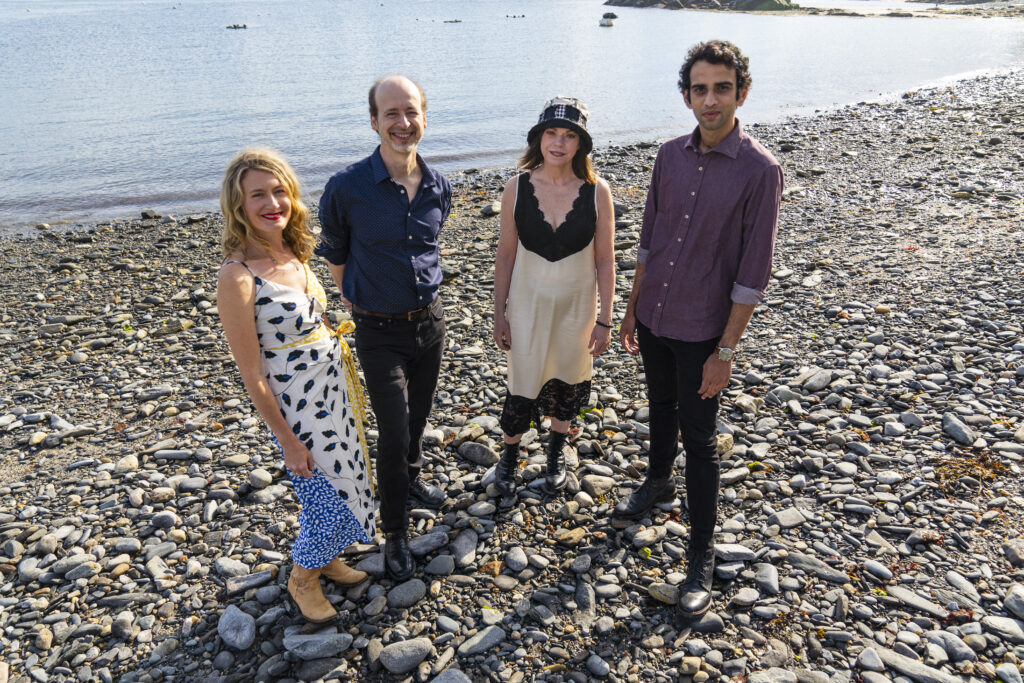
Lúnasa
December 16 @ 7:00 PM

6 pm doors – 7 pm show
- ADVANCE PURCHASE: $40
- AT THE DOOR: $50
- All tickets will incur an additional $8.00 surcharge.
- MEMBERS: Please click here to ensure you are logged in so your discount is reflected above and applied at checkout.
- All surcharges and member discounts will be calculated at checkout.
- Click Here to learn how our ticket surcharge supports OLS.
Lúnasa, one of the most influential bands in the history of Irish traditional music, celebrate its twentieth anniversary in 2017. Named after an ancient Celtic harvest festival in honour of the Irish god Lugh, the group that Folk Roots magazine once called an “Irish music dream team” was formed from members of some of Ireland’s greatest bands and over the years has proven its mettle time and again, having sold over a quarter of a million records, performed more than 2,000 shows in high-profile concert venues across 36 countries, and collaborated with many notable artists outside the tradition. Two decades ago they ascended to the forefront of contemporary Irish music, and there they’ve remained, a leading voice in the genre and the standard against which others are compared.
The seeds were sown in 1996, when all-Ireland fiddle champion Seán Smyth (Donal Lunny’s Coolfin), bassist Trevor Hutchinson (The Waterboys) and guitarist Donogh Hennessy (Sharon Shannon Band) embarked on a series of trio gigs in Scandinavia. Together, they began to develop a new sound that they sensed had incredible promise. Upon returning home to Ireland, they invited flute player Michael McGoldrick (Flook, Toss the Feathers) and uilleann piper John McSherry (Coolfin) in toadd sonic depth. A tour of Ireland as “Seán Smyth and Friends” followed that yielded a series of live recordings that would become the basis of their critically acclaimed eponymous CD debut.
1997 was the pivotal year. It began with a tour of Australia, the first under the Lúnasa flag, which included virtuoso flute player Kevin Crawford (Moving Cloud) as a temporary stand-in for McGoldrick. Hennessy recalled how the band “went down a bomb” there, a feeling the Sydney Morning Herald echoed when it marveled at the group’s live energy and how excitement for their heavy, rhythmic sound “[sent] shock waves through the audience.” These tours cemented the band’s musical approach and established their sterling reputation as a live act. But it was the release of Lúnasa later that year that put it all together: the album was a fast best-seller, topped Hot Press magazine’s folk charts, and made the band a darling of the traditional music scene. The band’s new musical direction proved fertile artistic ground, indeed.
Lúnasa’s second album Otherworld followed in 1999 and raised their profile further, with New York’s Irish Voice newspaper declaring them “Ireland’s newest supergroup” and “the hottest Irish acoustic band on the planet.” By this time, Crawford had not only become a full time band member, but the group’s live show was attracting significant international attention. The Times of London praised them for demonstrating “that there is far more to the Celtic tradition than the cliches of Riverdance,” while the South China Morning Post described how the band “get[s] all but the dead up and dancing.” The Japan Times recommended them “[to] any fan of real Celtic music who wants to work up a sweat.”
The addition of master uilleann piper and whistle player Cillian Vallely (Riverdance, Bruce Springsteen) in early 1999 galvanized the group’s sound and led to their celebrated third album, The Merry Sisters of Fate (2001). A hit with critics, the album’s strength led MOJO magazine to name the band “the new gods of Irish music,” adding that “nobody since the Bothies has wielded such a thrilling rhythmic underlay.” Billboard raved that “anybody who listens can’t help but find them contagious.” It seemed like the band the Washington Post once said was “determined to drag Irish folk music kicking and screaming into the 21st century” had achieved what they set out to do. “Even the final fade promises much,” Roots World wrote. “You know they’re heading into the future, not obscurity.” Lúnasa’s next two releases, 2003’s Redwood and the 2004 live album The Kinnitty Sessions, continued to deliver on the band’s promise. They toured heavily for both and received much deserved accolades for their efforts. The 2003 Quebec City Summer Festival awarded them with the “Coup de Coeur Miroir” prize for their performances while The Kinnitty Sessions won Irish Music Magazine’s “Best Traditional Album” award for 2005 and was nominated for “Folk Album Of The Year” at the 2004 BBC Radio 2 Awards. “The results,” Australia’s Daily Telegraph wrote of The Kinnitty Sessions “are a wonderful affirmation of the powers of this band and this tradition.”
Things changed a bit for the band with their sixth album, Sé. It was the first Hutchinson produced, which gave them an increased measure of control over their sound, but it was also the first without Hennessy, who left shortly before the album was recorded. Instead of finding Hennesy’s replacement right away, they filled the lacunae he left with three guitarists, Tim Edey, Paul Meehan (who stayed on to tour), and Conor Brady, and the results were spectacular. In its review, Hot Press lauded Sé, saying “Lúnasa are at that place where the past meets the future,” adding “they reveal a spirit few of their contemporaries can equal, as they seem to choose from a palette containing a range of sounds and moods not available to more mortal players.” The concert reviews were better than ever, too, with NPR’s All Things Considered hailing the band’s live show, saying “Lúnasa’s trademarks have always been the subtle rhythmic segues between tunes and the way they ratchet up the intensity during each set of music. […] There’s real passion in the performances.” After The Story So Far…, a 2008 “best of” compilation, the band followed in 2010 with Lá Nua, their first self-released album since Lúnasa. Lá Nua featured more original compositions than any of the band’s previous albums and was seen as a breath of fresh air, with Sing Out magazine calling it “another ineffable masterpiece” and the Irish Echo newspaper ranking it second on its list of the “Top Ten Traditional Albums of 2010.” That year, the group also appeared on the opening track of singer-songwriter Natalie Merchant’s Leave Your Sleep, an album the Wall Street Journal called “an ideal fit between poetic and musical rhythms.” Lúnasa’s contribution to it was roundly praised. Then, in, 2013 the band released Lúnasa with the RTÉ Concert Orchestra, a bold collaboration with the in-house orchestra of Ireland’s national broadcaster, RTÉ. With a new guitarist Ed Boyd (Flook, Kate Rusby, and Cara Dillon) in the fold and a set of remarkable arrangements written by Niall Vallely, the album “[built] on the group’s immediately recognizable sound and [gave] their music an exciting new dimension” (Irish Echo). Its release led to groundbreaking performances in Ireland, France, and the US that critics called “a successful blend of articulation and raw nerve end pulse” (fRoots). While there have been collaborations between orchestral and traditional groups before, none have matched this album’s excitement or intensity.
In recent years, Lúnasa has continued to tour, dazzling crowds all over the United States, Canada, Japan, and Europe. In addition to major collaborations with the likes of legendary singer-songwriter Mary Chapin Carpenter (2015) and bluegrass superstar Tim O’Brien (2016), they’ve introduced star musician Colin Farrell (Project West, Grada) to the band, who has been sharing fiddle duties with Smyth and who brings enormous talent and an innate understanding of the group’s sound. Legendary Irish fiddler Kevin Burke once said that “maintaining the unique, intimate qualities of a musical tradition while at the same time meeting and fulfilling the demands of the contemporary music world is a difficult juxtaposition to achieve, yet Lúnasa have managed to accomplish exactly that.” From the start, the band’s complex arrangements and unique sound reshaped the boundaries of traditional music and energized audiences the world over. Twenty years on, the group continues to evolve, playing new music that is as state-of-the-art and aggressively infectious today as it was so long ago.
In 2018 and after an extended break from the studio, Lúnasa celebrated 20 years on the road with an exciting new album “Cas” breaking new ground for the band by adding vocals for the first time. Long term friends and collaborators Natalie merchant, Mary Chapin Carpenter and Tim O’Brien joined with blues legend Eric Bibb and Irish folk singer Daoiri Farrell.
Related Events
IMPORTANT COVID-19 INFORMATION Effective immediately, we will no longer require proof of vaccination or masks at our shows. PLEASE NOTE: additional COVID-19 protocols beyond the venue policy MAY be required by a specific artist or band. PLEASE REFER TO THE SPECIFIC EVENT PAGE for the event you are attending for the most up to date information. TICKETING TERMS & CONDITIONS
One Longfellow Square does not assume liability; the ticket holder will assume all risks involved. By purchasing a ticket to this event you agree to assume full liability for any risks incurred before, during, and after the event and agree to the current Terms of Use.



